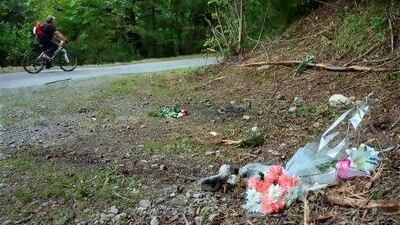LONDON // In the fog of rumour and speculation that engulfs the search for an explanation of the killings of a British-Iraqi couple, an elderly relative and an apparent stranger at a beauty spot in the French Alps, no theory has seemed too outlandish to advance.
From a family money feud to Saddam Hussein's fortune, from Mossad's deadly international reach to questions about the professional activities of two of the victims, the list of possible answers to the mystery continues to grow.
And to add to the bewildering array of leaks and supposed clues, the notion of a random attack by a deranged gunman - at first thought the least likely scenario - is the most recent to surface.
Two months after the shootings in a remote parking area near the village of Chevaline, above Lake Annecy, French investigators have given little indication that they are close to identifying the true cause of the slaughter, let alone making an arrest.
The lives of Saad Al Hilli, 50, his wife, Ikbal, 47, his Swedish mother-in-law, Suhaila Al Allaf, 74, a Swedish national also of Iraqi origin, and a French cyclist, Sylvain Mollier, 45, came to a violent end on September 5.
The Al Hillis' two children were orphaned by the murders. Zainab, seven, was lucky to survive after being shot in the shoulder and battered with the 7.65mm automatic pistol used in the shootings.
Her four-year-old sister, Zeena, hid beneath her mother's lifeless body in the family's BMW and was found shocked but unhurt several hours after the crime.
As the competing theories for the shootings have been floated, it has become difficult to separate fact from supposition.
Officials in charge of the inquiry have spoken relatively little in public on matters of substance, leaving media of France, Britain and other European countries to base their reports on a string of anonymous statements from a variety of sources.
Indeed, Eric Maillaud, the public prosecutor for Annecy, has spoken with evident pride about how cautious he has been, despite giving repeated television and radio interviews, in his pronouncements.
In his most recent interview, published on October 27, he told the French daily newspaper Le Monde, he envisaged a protracted investigation in which officers would need to be patient and probably rely on "a little luck".
It would be surprising if he did not know, or have reason to believe, rather more than he is prepared to divulge.
But in one possibly significant comment, he told Le Monde the theory of a lone, psychologically disturbed killer was "gaining ground".
Records kept by psychiatric institutions in the French Alps and across the nearby borders of Italy and Switzerland were being examined, he added.
Yet his comments coincided with reports originating in Germany, but also reported by Le Monde, that described an Al Hilli family link to a Swiss bank account into which the late Iraqi dictator's Baath party had deposited US$1 million (Dh3.67m) several years before his regime was ousted.
According to the German intelligence sources quoted in reports, Saad Al Hilli's father - previously reported to have fled from Iraq after falling out with the Hussein regime - was responsible for the account until his own death last year, since when his son had access to it.
This adds to the intrigue created by media reports immediately after the killings of a dispute between Saad Al Hilli and his brother, Zaid, 53, over their father's will.
Before leaving for his family's French holiday, Saad Al Hilli reportedly changed the locks on his home in the town of Claygate, south of London, where he also kept an illegal taser gun.
In the painstaking scrutiny of Saad Al Hilli's life, more unexpected information has surfaced. He stored and assiduously scanned into his computer a mass of personal data in English, Arabic and Spanish, including even greetings cards. Some media reports say he visited online forums using a pseudonym to post anti-Semitic comments.
Mr Maillaud, the prosecutor, appeared in his Le Monde interview to attach no current importance to the financial background and the newspaper itself said there had been no movement in the Swiss account since the death of Mr Al Hilli senior. There has been no suggestion that either French or British investigators actively consider Mr Al Hilli's brother a suspect.
The prosecutor also dismissed a theory being pushed relentlessly in British tabloid coverage that the French victim, who worked in the nuclear energy industry, may somehow be the key to the killings. This would depend in part on the supposition that he was killed first, which Mr Maillaud denies, saying Mollier was still regarded as "collateral damage" having strayed by chance upon the scene.
One British newspaper, the Daily Mail, has challenged this explanation. It quoted an anonymous respected Middle East security analyst as expressing the belief that Mollier and Saad Al Hilli may have been involved in a plot to supply nuclear material to Iran and were "eliminated by state-sponsored Israeli assassins".
The evidence for such a theory appears flimsy.
Mr Maillaud, as well as appearing to exclude Mollier's background as a crucial element, said scrutiny of Saad Al Hilli's professional life, working in the satellite industry, had revealed nothing to suggest a motive.
Perhaps the one dependable assumption to be made is that the Al Hilli girls, now being looked after by relatives in Britain, will need sensitive care for some years if they are ever to come to terms with the circumstances in which they were orphaned and could easily have been killed too.
What is less certain is whether either will ever be able to provide the vital clues that would lead police to whoever murdered their parents and grandmother.


